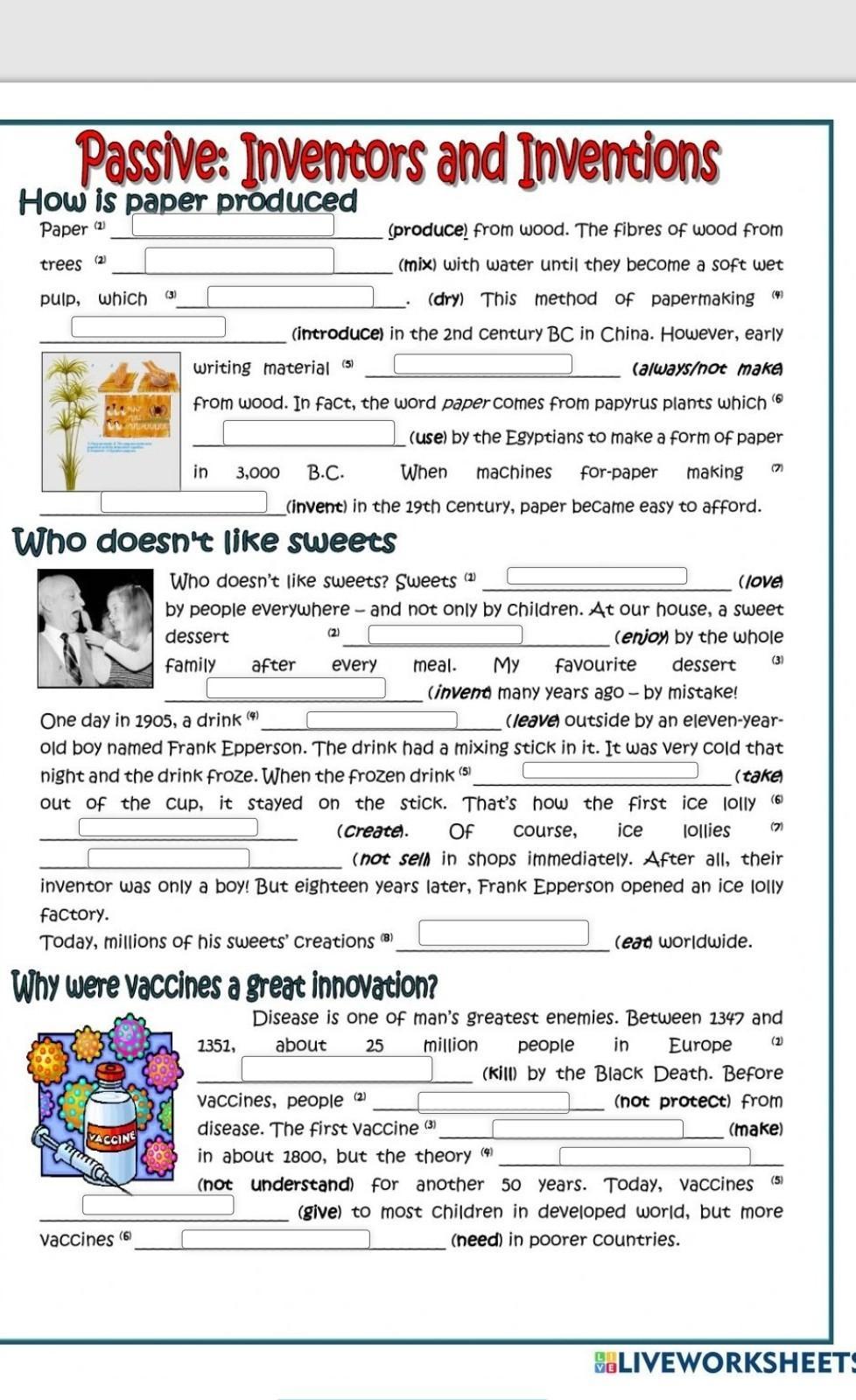Passive: Inventors and Inventions How is paper produced Paper (2) trees (2) pulp, which (3) writing material (5) (always/not make from wood. In fact, the word paper comes from papyrus plants which 6 (use) by the Egyptians to make a form of paper 3,000 B.C. When machines for-paper making (invent) in the 19th century, paper became easy to afford. in vaccines (6) (produce) from wood. The fibres of wood from (mix) with water until they become a soft wet (dry) This method of papermaking (introduce) in the 2nd century BC in China. However, early Who doesn't like sweets Who doesn't like sweets? Sweets (2) (love) by people everywhere - and not only by children. At our house, a sweet dessert (enjoy by the whole family (2) 1351, after every meal. My favourite dessert (invent many years ago by mistake! Why were vaccines a great innovation? One day in 1905, a drink (4) (leave) outside by an eleven-year- old boy named Frank Epperson. The drink had a mixing stick in it. It was very cold that night and the drink froze. When the frozen drink (5) out of the cup, it stayed (take (2) on the stick. That's how the first ice lolly (6) (Create). Of course, ice lollies (not sell in shops immediately. After all, their inventor was only a boy! But eighteen years later, Frank Epperson opened an ice lolly factory. Today, millions of his sweets' Creations (8) (27 (ead worldwide. (3) Disease is one of man's greatest enemies. Between 1347 and about 25 million people in Europe (2) (kill) by the Black Death. Before (not protect) from (make) vaccines, people (2) disease. The first vaccine (3) in about 1800, but the theory (4) (not understand) for another 50 years. Today, Vaccines (5) (give) to most children in developed world, but more (need) in poorer countries.

Ответы
Ответ:
The production of paper is a process that involves the use of trees to make pulp, which is then transformed into writing material. Although paper is often thought of as being made from wood, it can actually be made from a variety of sources, including papyrus plants, which were used by the ancient Egyptians to make a form of paper over 3,000 years ago. The introduction of machines for papermaking in the 19th century made paper production more efficient and affordable. The method of papermaking involves mixing the fibers of wood with water until they become a soft, wet material that can be dried into paper.
Sweets are loved by people everywhere, not just children. At the writer's house, the whole family enjoys a sweet dessert after every meal, and the writer's favorite dessert was invented by mistake many years ago. The invention of ice lollies was the result of an eleven-year-old boy named Frank Epperson leaving a drink outside with a mixing stick in it, which froze and stuck to the stick. Although ice lollies were not sold in shops immediately, Frank Epperson opened an ice lolly factory 18 years later and today, millions of his creations are enjoyed worldwide.
Vaccines were a great innovation because they offered protection from disease, one of man's greatest enemies. In Europe, the Black Death killed between 1347 and 25 million people before vaccines were available. The first vaccine was created in about 1800, although the theory behind vaccines was not understood for another 50 years. Today, vaccines are given to most children in developed countries, but more are needed in poorer countries.